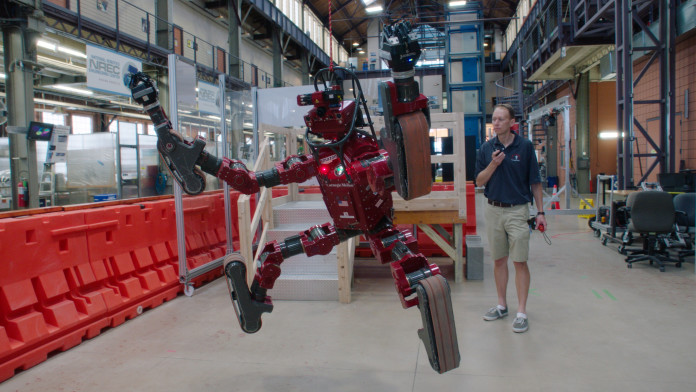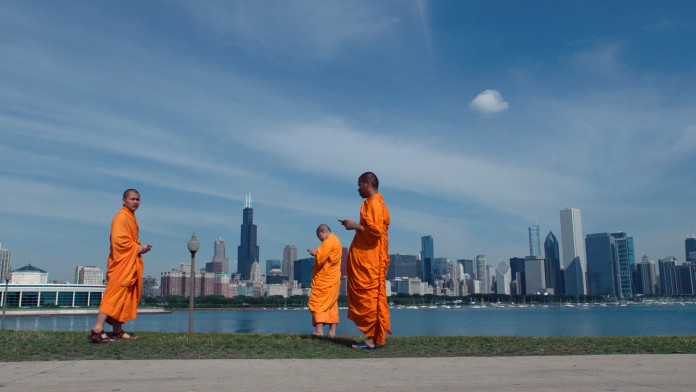Movie Review: Lo And Behold: Reveries Of The Connected World
Published on April 21st, 2016 in: Documentaries, Film Festivals, Media, Movie Reviews, Movies, The Internets |In Lo and Behold: Reveries of the Connected World, a ten-part essay film that’s as far-reaching and excessive as its title, Werner Herzog explains the Internet as though you’ve never heard of it. If I didn’t know any better, I could actually believe that Herzog never has. He approaches this sprawling, impossible-seeming project with the often childlike point of view of a complete outsider and, one might say, Luddite. This usually manifests itself in a funny way but it also allows Herzog an entry point that’s not bogged down with jargon and which never seems patronizing. In fact, it easily and readily walks the line between wonderment and revulsion.
Beginning, naturally, at the beginning, Herzog documents the day of the Internet’s first transmission, on October 29, 1969. The message is meant to be “login,” but because of a system crash, the only two letters sent are “lo,” giving us the film’s title. I think Herzog attaches more meaning to this than it warrants, but he gets some interviews and footage in this “dawn of the Internet” portion of the film that balance wonderment and ugliness in an intriguing way, like when he shows the first server and talks about it’s unique smell, something we don’t normally associate with computers of any sort.
The tone switches abruptly as Herzog explores the dark side of the Internet. He first focuses on a family tragically cut apart by technology. Their young daughter was texting and driving (the perils of which Herzog explores in his troubling anti-distraction PSA, “From One Second To The Next”) when she lost control of the vehicle, causing a fatal accident. The family was shocked and heartbroken when a grisly picture of her body at the scene (allegedly taken by an EMS responder) was circulated around the Internet and, tragically, to the family themselves. You can see the hurt and anguish in their eyes as they relate this story and when the mother says that the Internet is pure evil, it’s hard to disagree in that moment. Herzog, to his credit, doesn’t show the picture or any other photos of the girl at all, and his choice to show a room she particularly liked in her home instead speaks to his thoughtfulness as a documentarian.
In the above segment and most others in Lo and Behold, Herzog has a way of extracting genuine, truthful testimonies from the wide-ranging group of people he’s chosen to feature in the film. His use of footage seems raw and amateurish as we sometimes see extraneous details like the couple of cringeworthy seconds after an interview ends, but anyone familiar with Herzog’s fiction and nonfiction work knows that this is by design. In these seconds, subjects stare uncomfortably into the camera, subtly communicating something even more honest than anything they’ve just said. Other, more casual interjections from Herzog himself in other interviews lead his subjects to topics and ideas that they wouldn’t normally entertain. This gives the “talking head” segments more depth and value than they would have otherwise.
A segment called “Life Without The Net,” features people and whole communities who have disconnected entirely. Some unplug by choice, like the town of Green Bank, West Virginia where they block all wireless signals in order to do research involving radio waves for the National Radio Astronomy Observatory. We also hear from those who feel forced to unplug, like a retreat near Seattle for people who feel physical sickness around wireless signals. While it’s easy to dismiss this latter group as psychosomatic nutbars (and admittedly they do come off that way the longer they talk), you can’t help but feel that no one would ever make up this disease and abandon their families for it unless they really believed in what they were saying. Again, this is where Herzog’s ability to wrench dramatic and affecting accounts from people like this elevates this documentary beyond the average. The pleading from this latter group of people for anyone to believe them is tragic on several levels and is the most compelling part of Lo and Behold for me.
Further exploring the Internet’s dark side, we see the horrors of Internet addiction, with accounts of a boy who had his leg amputated because of his sedentary lifestyle, and South Korean gaming addicts who wear diapers in an effort to prolong game time. We’re also introduced to several young people that have overcome, or are dealing with, their online addictions who provide a bit of a hopeful conclusion to this section of the film.
Future-focused segments of Lo and Behold discuss self-driving cars, artificial intelligence, and a life beyond our understanding of the Internet. There’s a good range of subjects and discussions here, as in the rest of the film, that capture the breadth of thinking on the subject—some fatalistic, and others, like Elon Musk, determined to reach the stars. The section called “The Net On Mars” seems disconnected, though fascinating, as we hear from Musk and others about building colonies on Mars “just in case something goes wrong” with Earth. Sebastian Thrun, who is building self-directed cars, shows us how these vehicles will “learn” from every accident that occurs, as they’re all connected, possibly bringing them very close to an artificial intelligence. This invites Herzog to ask if they can be taught to respect and represent human values, and the question of who assumes responsibility in case of an accident. These future visions are explored with both hopefulness and skepticism, providing a well-nuanced outlook for the internet and its associated effects on society.
Though not the cinematic marvel of Grizzly Man or Cave of Forgotten Dreams, Herzog has condensed the history of the Internet so far, into something like a time capsule. He plucks representative samples from just about everywhere and mashes them all together into something that feels dated almost as soon as you watch it. That’s not Herzog’s fault, nor anyone’s, though. The speed at which the Internet is changing, and changing us, isn’t something that allows much time for reflection. Maybe you have to unplug to get the real sense of that, if only for a minute.
Lo and Behold: Reveries of the Connected World screens as part of the Special Presentations programme at the 2016 HOT DOCS International Documentary Film Festival in Toronto:
Thursday April 28 / 9:45 p.m. / TIFF Bell Lightbox 1
Friday April 29 / 1:00 p.m. / Bloor Hot Docs Cinema


Time limit is exhausted. Please reload the CAPTCHA.